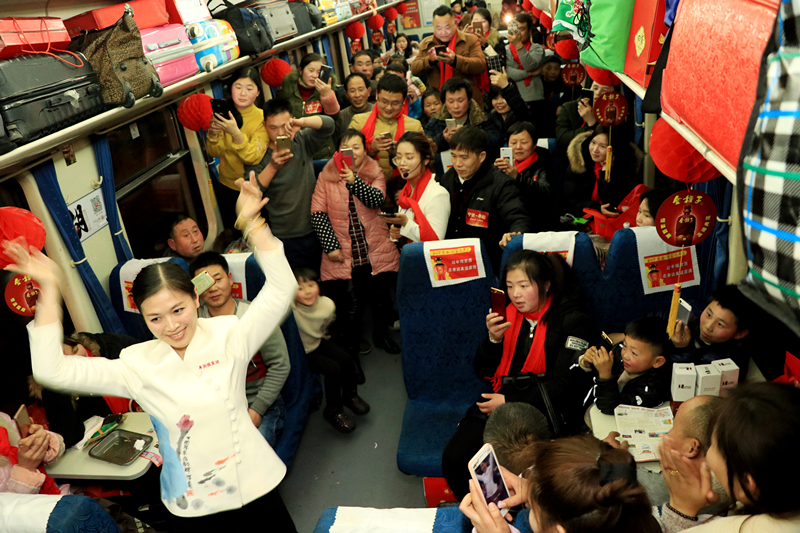City works to lure natives back for business, family


Looking ahead to Spring Festival, Yu Bingjian and his family returned to their rural hometown in Fuyang, Anhui province, on Feb 7.
For the past 15 years, Yu has been working as an excavator operator in Ningbo, a coastal city in Zhejiang province - first living alone but later joined by his wife, sons and daughter.
In some of those years, Yu was unable to return to his native Zhanying, a village in Linquan county, which has a population of 2.3 million.
It wasn't that he didn't want to go. Fuyang government data show that more than 300,000 residents work in Ningbo, and there was lots of competition.
"It was too hard to buy a train or bus ticket," Yu said.
As a result, the Yu family had to spend three consecutive Spring Festivals in Ningbo.
Last year, however, the government of Fuyang arranged for a train to pick up more than 1,300 migrant workers and take them from Ningbo to Fuyang free of charge.
As the point of origin of a national diaspora of more than 3.2 million people migrating to other parts of the country to work, Fuyang - whose total population is more than 10 million - is hoping to woo its workers home so they can help develop the local economy.
One of the actions the city has been taking is picking up thousands of such migrant workers with buses and trains, and taking them across the country to their hometowns.
Yu's eldest son and daughter-in-law had to stay in Ningbo for Spring Festival last year because their son was only 3 months old, and travel would be difficult. Though the festival places emphasis on family reunions, Yu thought returning to his hometown was even more important.
"Staying in Ningbo for the festival was just too lonely," Yu said.
When Yu was home during the festival last year, he made two plans: to find a girlfriend for his younger son, who is 21, and buy a car for the family.
The first plan failed, only to make him more determined to fulfill the second, hoping that it would then be easier to attract a young women in the village or nearby.
"It's almost impossible for him to find a girlfriend in Ningbo," Yu said. "So this year we returned home by driving our own car, even though my eldest son and his wife had to stay in Ningbo again because their son came down with a serious cold recently and needs to go to the hospital every day," Yu said.
Yu Ke, the son, said: "Though I also wanted to return home for the celebration of Spring Festival, I take it easier than my parents when I have to stay here."
The Yu family didn't need to take the free train this year, but thousands of other people were thankful for the convenience provided by the local government.
Officials from Fuyang said the move was intended to appeal to migrant workers's emotions about returning home, not merely for the festival but to think about staying there for work opportunities and starting their own businesses.
Yu Bingjian said he might be able to return home while remaining on call for the government in the future, while his sons and daughter - who is a middle school student in Ningbo and believes there are better education opportunities in the city - prefer to remain in Ningbo.
"Thanks to development, the number of Fuyang migrant workers in Ningbo stopped increasing around 2016," said Li Hu, head of the Fuyang Chamber of Commerce in Ningbo.
Chamber membership includes more than 80 Ningbo-based enterprises founded by Fuyang natives, most of whom were migrant workers years ago.
"Older migrant workers appreciate stronger ties with their hometown, even though many in the younger generation prefer to live in the cities," Li said.
zhulixin@chinadaily.com.cn
- China's unyielding fight against corruption
- Snow sculptures in China's 'Ice City'
- China accelerates urban renewal efforts to create livable, resilient cities
- Ice 'Terracotta Warriors' to debut at Harbin Ice-Snow World
- Major airport in Guangzhou sees record passenger throughput
- China launches new project to support young scientists





































